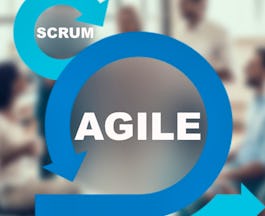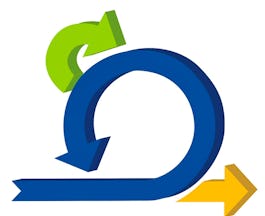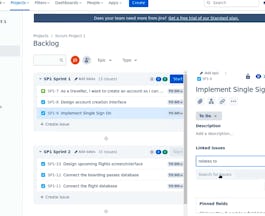Filter by
The language used throughout the course, in both instruction and assessments.
Choose the Scrum Course That Aligns Best With Your Educational Goals

Skills you'll gain: Software Engineering, Agile Software Development, Scrum (Software Development), Leadership and Management

LearnQuest
Skills you'll gain: Agile Software Development, Scrum (Software Development), Project Management, Software Engineering, Continuous Delivery, Product Development, Continuous Integration, Leadership and Management, Product Management, Collaboration, DevOps, Software Testing, Strategy, Product Lifecycle, Planning, System Software, Devops Tools, Programming Principles, Risk Management

Google
Skills you'll gain: Agile Software Development, Software Engineering, Project Management, Scrum (Software Development), Strategy and Operations, Collaboration, Leadership and Management, Communication, Entrepreneurship, Product Management, Influencing, Problem Solving

SkillUp EdTech
Skills you'll gain: DevOps, Software Engineering, Computer Programming, Agile Software Development, Programming Principles, Software Engineering Tools, Application Development, Software Architecture, Communication, Continuous Delivery, Cloud Applications, Computer Architecture, Continuous Integration, Scrum (Software Development), Systems Design, Leadership and Management, Project Management, Cloud Computing, IBM Cloud, Information Technology, Operating Systems, Python Programming

Coursera Project Network
Skills you'll gain: Project Management, Scrum (Software Development), Software Engineering

SkillUp EdTech
Skills you'll gain: Project Management, Scrum (Software Development), Software Engineering

Skills you'll gain: Project Management, Strategy and Operations, Leadership and Management, Communication, Business Communication, Collaboration, Agile Software Development, Software Engineering, Entrepreneurship, Scrum (Software Development), Planning, Supply Chain and Logistics, Change Management, Finance, Organizational Development, Product Management, Risk Management, Budget Management, Influencing, Culture, Emotional Intelligence, People Management, Problem Solving, Procurement
 Status: Free
Status: FreeAtlassian
Skills you'll gain: Agile Software Development, Leadership and Management, Planning, Product Development, Product Management, Project Management, Scrum (Software Development), Software Engineering, Software Testing, Technical Product Management, Jira (Software)

University of Alberta
Skills you'll gain: Software Engineering, Agile Software Development, Product Management, Design and Product, Leadership and Management, Project Management, Planning, Application Development, Product Design, Product Development, Entrepreneurship, Strategy and Operations, Business Analysis, Collaboration, User Experience, Scrum (Software Development), Supply Chain and Logistics

LearnQuest
Skills you'll gain: Agile Software Development, Collaboration, Leadership and Management, Planning, Product Development, Product Lifecycle, Product Management, Project Management, Scrum (Software Development), Strategy, Software Engineering

University of Colorado System
Skills you'll gain: Leadership and Management, Business Psychology, Entrepreneurship, Communication, Strategy and Operations, Leadership Development, Change Management, Organizational Development, Project Management, Adaptability, Collaboration, Emotional Intelligence, Human Resources, Resilience, Business Transformation, Strategy, Business Communication, Professional Development, Scrum (Software Development)

Skills you'll gain: Leadership and Management, Strategy and Operations, Cloud-Based Integration, Business Analysis, Business Transformation, Business Process Management, Cloud Applications, Strategy, Customer Analysis, Planning, Product Management, Project Management, Business Intelligence, Software As A Service, Supply Chain and Logistics, Cloud Standards, Cloud Computing, Network Architecture, Software Architecture, System Software, Communication
Searches related to scrum
In summary, here are 10 of our most popular scrum courses
- Introduction to Agile Development and Scrum: IBM
- Scrum Master Certification: LearnQuest
- Agile Project Management: Google
- IBM IT Scrum Master: SkillUp EdTech
- How to create a Jira SCRUM project: Coursera Project Network
- Scrum Master: SkillUp EdTech
- Google Project Management:: Google
- Agile with Atlassian Jira: Atlassian
- Software Product Management: University of Alberta
- Introduction to Scrum Master Training: LearnQuest










